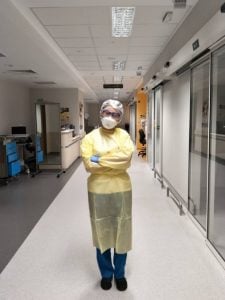Every year on 12 May, we celebrate International Nurses Day (IND), which is also the anniversary of the birth of Florence Nightingale, founder of modern nursing. Since 2017, the theme for IND has been Nurses: A Voice to Lead. This year, its sub-theme is A Vision for Future Healthcare. This could not be a better reflection of the role nurses play in the healthcare industry. As the largest health profession across the world, nurses have a vast potential and value if they are harnessed appropriately with the right training and education, especially in embracing technology for the digital revolution that healthcare is currently undergoing.
I have been a nurse since completing my general nursing training in 1990, having worked mainly in the area of critical care while completing my specialisation in Neonatal Nursing. I then found my calling as a Nurse Educator. Currently, I am the Head of Nursing Division at International Medical University (IMU) and also sit on the Board of Studies for several nursing colleges.
If you’ve ever been admitted to the hospital, you will realise that nurses spend more time with patients than any other provider. Nurses, especially those working in the critical units such as the intensive care unit, play an essential role in detecting patients at risk of deterioration through ongoing assessment and action in response to changing health status.
In my opinion, this is what makes nurses the true “front-liners” of the healthcare industry. Not undermining the work other healthcare workers do; it takes an entire ecosystem of healthcare professionals for the industry to run effectively. But nurses form the backbone of every health system, accounting for more than half of the global health workforce. World Health Organisation (WHO) noted in its publication “Global strategic directions for strengthening nursing and midwifery 2016-2020″ that nurses and midwives account for nearly 50% of the health workforce; out of the 43.5 million health workers in the world, it is estimated that 20.7 million are nurses and midwives. In our country, we recorded an estimate of 108,000 registered nurses in 2019, a figure that has shown an upward trend since 2016.
In its vision for Universal Health Coverage (UHC) by 2030, WHO estimates that the world will need nine million more nurses and midwives; we currently have a global shortage of 5.9 million nurses and midwives. I would like to add, even more so now with the pandemic! Especially in countries where the impact of COVID-19 has been significant, nurses are experiencing work fatigue and burnout causing some to reduce their working hours or retire early.
Why is there a shortage of nurses? First, the public’s wrong perception of nursing as a profession or career choice. Nursing was once perceived as a course for students with poor academic ability. The misconceptions about the nature of work and a lack of social recognition were identified as deterring factors in students’ choice of nursing as a career (Liaw et. al., 2016).
On the contrary, nursing is a rewarding career in being able to help others. However, it is a challenging and demanding vocation. Healthcare is known for its long hours and nurses are at the brunt of this gruelling profession. The job can be physically and emotionally draining, especially when it involves back-to-back hours due to covering more shifts because of the shortage of nurses. Therefore, developing skills such as stress management, clinical reasoning, listening skills, time management, and decision-making skills can help nurses face the daily challenges of their chosen career path.
At the same time, a nurse is a lot of things.
- You have to be a good counsellor as you are counselling patients and their family members.
- You’re also a manager and coordinator, working with other healthcare practitioners to help your patient recover better and faster.
- You’re an educator where you teach your patients and their family members what to do after discharge.
- You’re a researcher assisting in providing evidence-based research that is essential to quality nursing care.
- You’re also an advocator for your patients, to help them get the care they need and to provide them with long-term care by empowering your patient to take care of themselves better.
- You’re a clinical resource person where you’re required to coordinate clinical patient care and are responsible for activities such as ensuring quality patient care, overseeing nursing operations, teaching junior staff, and implementing the facility’s practices and policies.
In short, a nurse must be able to assume several roles, and be dedicated and passionate about helping people. Multitasking is a must!
Another reason for the shortage of quality nurses is education itself. Many nurses do not think there’s a need for advancement in their education despite it having proven that it can help them advance on so many levels for their nursing career. Quality education and constantly updating oneself with the latest industry knowledge enhances not only your skills but it also contributes towards patient safety. Nursing education has advanced over the years from the options to obtain a three-year nursing diploma to acquiring a four-year nursing degree which is increasingly preferred by nursing students. The minimum entry requirement has increased to at least five credits including Mathematics and Science subjects. You may also advance your education pursuit by specialisation, diversify with an MBA or Health Informatics and Analytics or even obtain a PhD in nursing.
In the west, we have what are known as nurse practitioners (NP) or Advanced Practice Registered Nurse (APRN). A NP is a registered nurse with advanced training and education who can diagnose and treat acute conditions, order diagnostic tests, and serve as a primary care provider except performing surgical procedures independently. They bridge the gap between nurses and physicians, performing high-level duties and often overseeing nursing staff.
Unfortunately, this is not yet introduced in our country, but it had started in Singapore. In my opinion, it is necessary to have such extended roles as it gives nurses more autonomy and leadership opportunities that go beyond basic nursing care. With specialisation and higher-level nursing education, nurse’s role has expanded and extended, where they are more seriously involved in facilitating the recovery of patients, educating family members and the public.
So, you see, the nursing career pathway doesn’t stop at just being a general nurse. Public perception of nursing as a career choice needs to change. In fact, the nursing career pathway had expanded to three main tracks namely clinical, academic and management. One of the best aspects of nursing as a profession is the ability to work in many types of environments and in many different roles. It is a field which is constantly evolving with various nursing specialty options. Therefore, the demand for nurses with specialty is extremely high. Some nurses had even become entrepreneurs and ventured into business while some with nursing administrative position enhanced their leadership and business administration skills by pursuing MBA to help them understand how business and finance relate to healthcare.
We are also seeing a new generation of young nurses who are more proactive and tech-savvy. This opens a new gateway for nurses to be involved in managing health data, and research and clinical trials to help improve the practice through evidence-based studies. While we are on the topic of technology, it is vital for nurses to upskill and adapt to new technology as healthcare moves towards digitalisation as a result of the Fourth Industrial Revolution that will introduce a host of advances in technology.
Personally, my dream as an educator and a nurse is to see my peers take up more extended roles by continuing their education and acquiring specialisation. There’s more than just basic nursing care. I look forward to nurses being leaders for their patients and for Malaysia to introduce the role of a nurse practitioner soon to provide more opportunities for my colleagues who want to expand their role in the healthcare system. There is a lot of potential being a nurse and to realise this, education is important not just for the individual nurse but also for the entire profession to be widely recognised for its significance in the healthcare system.
To all the nurses out there, Happy International Nurses Day!
Dr Lim Swee Geok is the Head of Division/Senior Lecturer of the Nursing Department at International Medical University Malaysia. She holds a PhD in Nursing from University Malaya, a Master’s in Education from Universiti Malaya, and a Bachelor’s in Nursing from UNISA. She is also a qualified Neonatal Nurse and has been a registered nurse since 1990.

The same article was published in:
Code Blue: Nursing: More than just basic care – Lim Swee Geok`
Infomed: NURSING: MORE THAN JUST BASIC CARE











